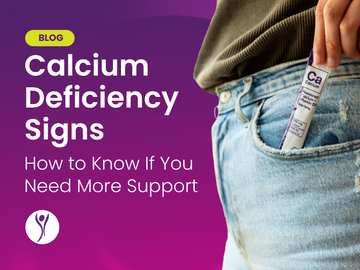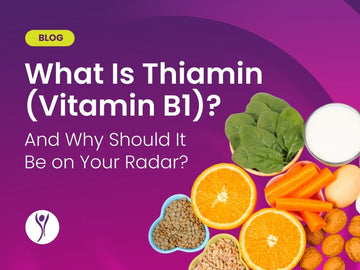by Brenda Hoehn on Apr 18, 2025

Understanding GLP-1 Vitamin Deficiency: What It Is and How to Address It
Ever heard about GLP-1 vitamin deficiency? If you're scratching your head, you're not alone. It's a term that's been gaining traction, especially among those using GLP-1 medications or exploring ways to support their healtah. Recent research from the National Institutes of Health (NIH) has highlighted that while GLP-1 medications are effective for weight management and blood sugar control, understanding their impact on nutrient absorption is crucial [1].
GLP-1 (glucagon-like peptide-1) medications, often prescribed for managing diabetes or aiding weight loss, can sometimes impact nutrient absorption, leaving users with vitamin deficiencies they might not even realize they have. This growing body of research has made it more important than ever to understand how these medications might affect your vitamin and mineral levels.
What Is GLP-1 Vitamin Deficiency?
GLP-1 vitamin deficiency isn't a standalone medical term but rather a condition associated with nutrient imbalances among users of GLP-1 receptor agonists, like semaglutide or liraglutide. A 2024 clinical study published in PMC found that patients using GLP-1 medications experienced significant changes in their nutritional status, particularly affecting essential vitamins and minerals [2].
These medications are game-changers for weight loss and blood sugar control, but they may inadvertently disrupt the body's ability to absorb key vitamins and minerals. So, what's happening? GLP-1 medications slow gastric emptying (how quickly food leaves your stomach), which can impact how nutrients are absorbed. Over time, this sluggish digestion might lead to deficiencies in essential vitamins like:
- Vitamin B12: Crucial for energy production and nerve health
- Vitamin D: Supports bone health and immune function
- Iron: Prevents anemia and promotes oxygen transport in the blood
- Calcium: Vital for strong bones and proper muscle function
-
Folate: Essential for cell division and DNA synthesisp
Symptoms of GLP-1 Vitamin Deficiency
Think you might be dealing with GLP-1 vitamin deficiency? Look out for these red flags:
- Fatigue: Constant tiredness could mean your B12 or iron levels are tanking
- Hair Loss: A lack of biotin or other nutrients may leave your locks looking lackluster
- Brain Fog: Difficulty focusing could stem from low folate or B12 levels
- Bone Pain or Weakness: Could be linked to a lack of calcium or vitamin D
- Digestive Issues: Iron deficiency can cause constipation, while low vitamin D might lead to gut inflammation
-
Pale Skin or Brittle Nails: Often a sign of low iron levels
If you're noticing any of these symptoms, it's worth discussing with your healthcare provider.
Causes Behind GLP-1 Vitamin Deficiency
According to a recent Healthline report [3], the mechanism behind these deficiencies isn't just about reduced appetite. The way GLP-1 medications alter digestion can impact nutrient absorption at a cellular level. Let's connect the dots:
- Reduced Appetite: Many GLP-1 users notice a decrease in hunger, which can lead to lower overall nutrient intake
- Slow Digestion: By slowing gastric emptying, GLP-1 medications might interfere with how efficiently your body absorbs nutrients
- Dietary Choices: If your diet lacks variety, you may not be getting enough vitamins to begin with
-
Weight Loss: Rapid weight loss, common with GLP-1 meds, can sometimes exacerbate nutrient deficiencies
How to Address GLP-1 Vitamin Deficiency
Research published in PMC specifically highlights the importance of targeted supplementation for GLP-1 medication users [4]. Here's how to stay ahead of the game:
1. Prioritize a Nutrient-Dense Diet
A well-balanced diet can work wonders. Focus on these nutrient-packed foods:
- Vitamin B12: Eggs, dairy, fish, and fortified cereals
- Vitamin D: Fatty fish, fortified orange juice, and mushrooms
- Iron: Spinach, lean meats, beans, and tofu
- Calcium: Yogurt, kale, almonds, and fortified plant-based milks
-
Folate: Avocados, lentils, and dark leafy greens
2. Supplement Strategically
Clinical studies support the importance of specialized supplementation for GLP-1 medication users [2]. ProCare Health's line of supplements is specifically designed to address these needs:
-
Multivitamin Soft Chews: The foundation for daily nutrition with therapeutic levels of essential nutrients for enhanced absorption*
-
B12 Complex: Convenient capsule delivering a full spectrum of B vitamins for daily nutritional support.
- Metabolic G3A: A comprehensive GLP-1 companion supplement combining key nutrients with Akkermansia muciniphila to support metabolic health and nutrient absorption*
- Iron 60mg with Vitamin C: Our specially formulated iron supplement enhances absorption through strategic vitamin C combination*
-
Calcium Chews: Featuring TruCal® calcium for superior absorption, these chews help maintain optimal calcium levels*
3. Stay Hydrated
Dehydration can worsen nutrient absorption issues, so aim to drink plenty of water throughout the day.
4. Regular Check-Ups
Your doctor can monitor your nutrient levels through blood tests and tweak your treatment plan if needed. Don't skip these appointments!
5. Mindful Eating
Chew slowly and savor your meals. This can enhance digestion and nutrient absorption, helping you get the most out of your food.
FAQs About GLP-1 Vitamin Deficiency
1. Can GLP-1 medications cause long-term deficiencies?
While GLP-1 medications themselves don't directly cause deficiencies, they can contribute to nutrient imbalances if dietary intake and absorption aren't optimized.
2. Should I stop taking my GLP-1 medication if I suspect a deficiency?
Don't stop any medication without consulting your doctor. Instead, discuss your symptoms and explore solutions like dietary adjustments or supplements.
3. Can GLP-1 vitamin deficiency be reversed?
Absolutely! With the right combination of diet, supplements, and medical support, you can restore your nutrient levels over time.
4. Are there natural metabolic support supplements?
Yes! Natural metabolic support supplements, like those containing Berberine or Akkermansia muciniphila, may offer similar benefits without affecting nutrient absorption.*
Take Control of Your Nutritional Health
GLP-1 vitamin deficiency might sound intimidating, but it's manageable with the proper knowledge and tools. By understanding the potential impacts of GLP-1 medications on your nutrient levels, you can take proactive steps to stay healthy, energized, and balanced.
Whether it's tweaking your diet, adding a GLP-1 companion supplement, or simply paying closer attention to how you feel, there's no shortage of ways to support your health journey. Stay informed, listen to your body, and don't hesitate to reach out to your healthcare team for guidance.
After all, a little effort now can go a long way in ensuring you're not just surviving but thriving.
References
[1] National Institutes of Health - StatPearls (2024). "Semaglutide." Available at: https://www.ncbi.nlm.nih.gov/books/NBK603723/
[2] PMC Clinical Study (2024). "Impact of Semaglutide on Nutritional Status." Available at: https://pmc.ncbi.nlm.nih.gov/articles/PMC10789635/
[3] Healthline (2024). "Nutrient Deficiency Risk with GLP-1 Medications." Available at: https://www.healthline.com/health-news/nutrient-deficiency-risk-wegovy-zepbound
[4] PMC Study (2024). "Thiamine and GLP-1 Medications." Available at: https://pmc.ncbi.nlm.nih.gov/articles/PMC11227085/
Note for Readers: This article is for educational purposes only and should not be considered medical advice. Always consult with your healthcare provider before making any changes to your supplement routine or medication regimen.
*These statements have not been evaluated by the Food and Drug Administration. This product is not intended to diagnose, treat, cure, or prevent any disease. Always consult your healthcare provider before starting any supplement regimen.

Is Your Body Asking for More Calcium?











